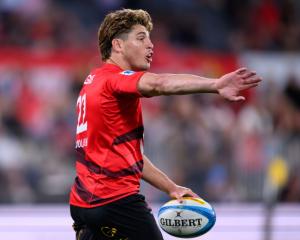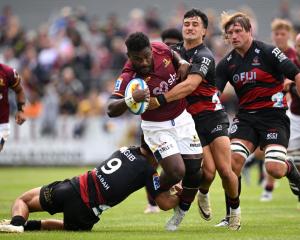Wyatt Crockett did not make the cut for tonight's test at Carisbrook but his inclusion in the initial squad indicates it will not be long before he becomes Otago Boys High School's 22nd All Black. Sports editor Hayden Meikle gets some help in naming the best of the best from the school.
Most high school rugby coaches have no idea what it is like to guide a future All Black but Brian Ashwin will soon be able to claim three.
Ashwin, who coached the Otago Boys High School First XV from 1990 to 2005, will take particular pride in the performance of Wyatt Crockett when the Crusaders prop gets his first test cap in the coming weeks.
Crockett was named in the initial All Black squad but did not make the final 22 for tonight's test against France at Carisbrook. Going on recent seasons, it can be assumed Crockett will get a run against Italy in a fortnight, or possibly in the second test against the French. He will become the 22nd All Black to be educated at Otago Boys.
Ashwin first encountered Crockett when the lanky prop turned up for his seventh form year at Otago Boys in 2001, his family having moved south from the Nelson area.
"He was a big lad. He was tall for a prop, even then, so he was great at lifting and mauling," Ashwin recalled.
"Wyatt was a nice young guy. He loved his footy and he trained hard."
Crockett followed in the footsteps of Byron Kelleher and Richie McCaw, both of whom were coached by Ashwin and went on to have sterling All Black careers. Halfback Kelleher played 57 tests and outstanding flanker McCaw will add to his 70 caps when he recovers from injury.
Ashwin said there was no way of predicting at the time whether the likes of Crockett, Kelleher and McCaw were going to progress to All Black level after their school days ended.
"People always ask me that question. But it's sometimes very hard to say, at the age of 17, where kids are going to end up.
"Wyatt's done well. He's made his way through the various teams and got better and better. He's matured, his scrummaging has lifted and his all-round play has improved."
Crockett was in an Otago Boys High School team that included flanker Garth Swan (New Zealand Schools captain the following year), flanker Tim Boys (Highlanders, Otago and Southland), halfback Scott Cowan (Highlanders and Southland), first five-eighth Henry Bates (Kaikorai) and second five-eighth Ben Kent (Zingari-Richmond).
Crockett moved to Christchurch after leaving school and steadily moved his way through the Canterbury ranks.
As well as the 21 All Blacks, Otago Boys has produced about 240 Otago players and a handful of other internationals, including Roy Radu (Canada), Colin Gilray, Tim Platt (both Scotland), Filipo Levi, Silao Sefo (Samoa), Tom Palmer (England) and Oscar Iwashita (Japan).
Picking a "Best XV" from nearly 140 years was always going to be a big ask, especially when you consider that 16 of Otago Boys' All Blacks are from the pre-war era.
School rugby historian Brian Panting and long-serving player, coach and master Neill Baker helped the Otago Daily Times pick some of the contenders for the school's top team:
Fullback: Scotland-born Jock Cuthill (Otago Boys 1906-09) toured North America with the All Blacks in 1913. Donald Stevenson (1917-18) played four games for the All Blacks. Tom Webster (1933-37) backed up Bob Scott on the All Blacks' tour of Australia in 1947.
Wing: Russell Watt (1949-53) played 42 matches, including nine tests, for the All Blacks. Colin Gilray (1898-1903) played one test, was awarded a Rhodes Scholarship and later played for Scotland. Herman Morgan (1915) played once for the All Blacks and was a national hurdles champion.
Midfield: George Dickinson (1918-21) was an All Black at 19 and then played cricket for New Zealand. George Wise (1918-21) and William Fea (1912-16) had brief All Black careers.
First five: Robert Black (1907-11) was an All Black who was killed in action in World War 1. Robert Mathieson (1913-14) played four games for the All Blacks.
Halfback: Byron Kelleher (1990-95) played at three World Cups. Charlie Saxton (1927-32) was an All Black, a member of the Kiwis rugby side and a long-serving administrator and official. Arthur Holden (1921-24) was a 1928 All Black. Jack Taiaroa (1877-82) was one of the first All Blacks.
Loose forwards: Richie McCaw (1994-98) is quite useful. Ken Stewart (1969-77) played 53 games for the All Blacks. John Burt (1888-90) and Gerald McKellar (1897-1900) had brief international careers. Rob Roy (1962-67) was an Otago stalwart.
Locks: Tom Palmer (1997) is a regular in the England squad. Richard Jerram (1978-82) played for Waikato and was an All Black triallist. John Blaikie (1987-91) played for the Highlanders and Otago and captained Cambridge University.
Props: James Allan (1871), known as the Taieri Giant, toured with the All Blacks in 1884. Victor George (1922) played three tests in 1938 and later served as an All Black selector. Wyatt Crockett (2001) is expected to make his test debut this year.
Hooker: The one position where Otago Boys was scarce. Panting and Baker picked Norm Wilson, who went to Wairarapa College but taught physical education at Otago Boys between 1949 and 1955.
Coaches: Arthur Marslin (1917-19) coached the All Blacks in 1953-54. Vic Cavanagh jun (1923-26) won the Ranfurly Shield with Otago and was considered desperately unlucky not to have coached the All Blacks.
Referees: Lindsay McLachlan (1971-73) could be assisted by Keith Morrison (1957) and Allan Fleury (1955), with Lyndon Macassey (1923-26) as video referee.















